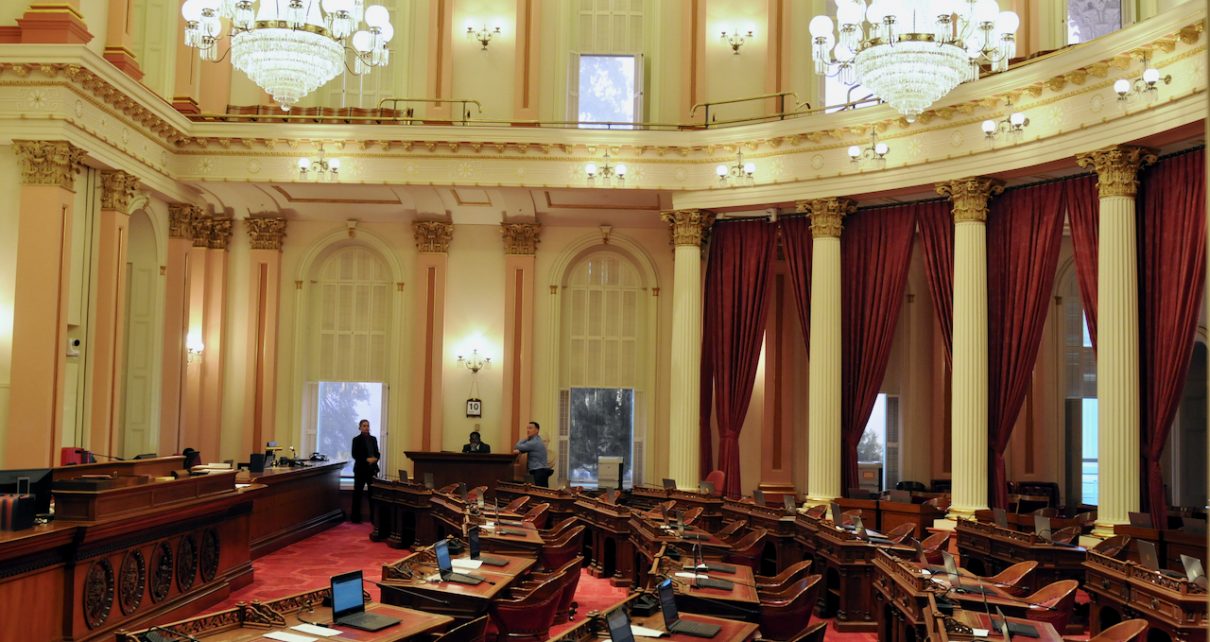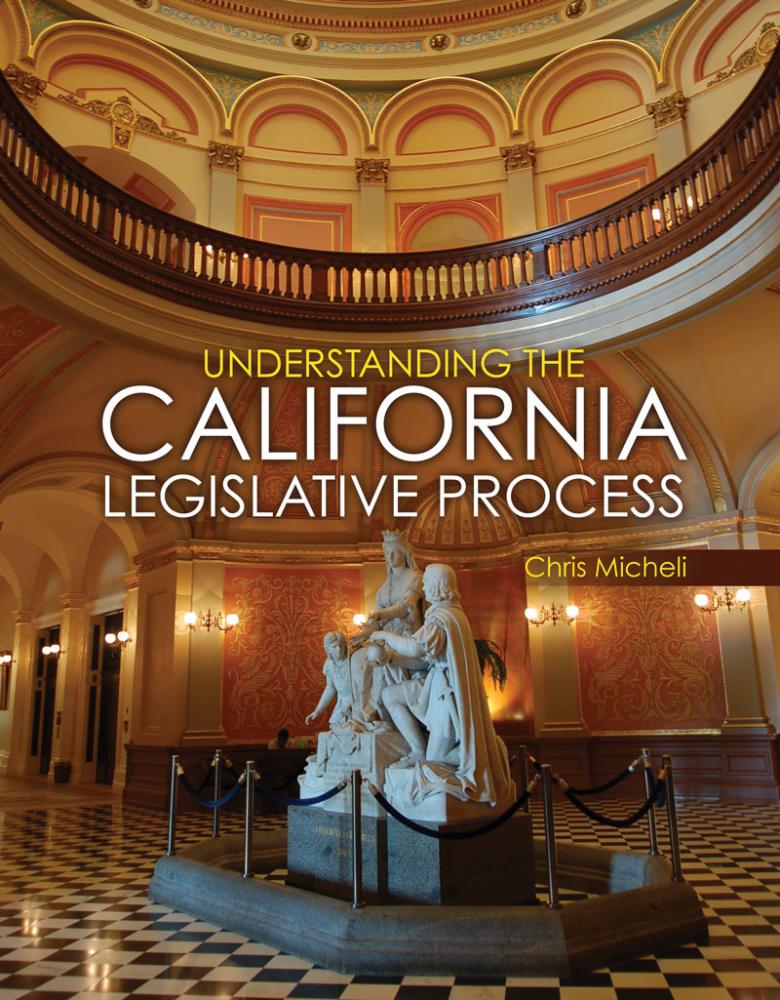
California Senate Chambers. (Photo: Kevin Sanders for California Globe)
The ‘Suspense File’ Process Used in Considering Fiscal Legislation
The intent behind the Suspense File is to consider all of the fiscal-related bills at one time, but the practical implications are another matter
By Chris Micheli, March 9, 2020 2:20 am
The two Appropriations Committees in the California Legislature have a unique procedure they each use called the “Suspense File.” Basically, any bill which has been keyed “fiscal” by the Legislative Counsel is referred to the fiscal committee in each house, called the Appropriations Committee, unless that measure is placed on consent or the amount of the bill’s fiscal impact is below a certain threshold established by the respective committees.
Under the Joint Rules of the Senate and Assembly, a bill is re-referred to the fiscal committee (after it passes the policy committee) of each house when the bill does any of the following (based upon a determination made by the Legislative Counsel’s Office):
(1) Appropriate money.
(2) Result in a substantial expenditure of state money.
(3) Result in a substantial loss of revenue to the state.
(4) Result in a substantial reduction of expenditures of state money by reducing, transferring, or eliminating any existing responsibilities of any state agency, program, or function.
Under the rules of both houses, the Committees on Appropriations may maintain a suspense file, to which bills may be referred by a vote of a majority of the members of the committee that are present and voting, pending further consideration by the committee. A bill may be taken off the suspense file and heard upon two days’ notice published in the Daily File by a vote of a majority of the members of the committee present and voting.
The “Suspense File” that is used by the Appropriations Committees in the Senate and Assembly is done as a means of managing their bills. While the intent behind the Suspense File makes sense in concept, to consider all of the fiscal-related bills at one single time, the practical implications of determining which bills stay or leave the Suspense File are interesting to watch.
The stated intent of the Suspense File is to consider all of the bills with a fiscal impact above a certain threshold at the same time (i.e., vote on all of the fiscal bills once all of them have been heard and are before the committee members on a single day). In this way, the fiscal committee can make decisions on all of the bills that have a fiscal impact at one time, rather than each week when they meet during the course of the Legislative Session.
As a result, the vast majority of bills (roughly 80%) go before the Appropriations Committees of each house for consideration after the policy committee has passed the bill, but before the bill reaches the floor of the respective house. Each fiscal committee has a threshold for the bills that will be referred to their respective Suspense Files. These amounts differ between the Assembly and Senate.
In the Assembly Appropriations Committee, the bills referred to the Suspense File are those with a fiscal impact of $150,000 or more from any fund source in any fiscal year and any bill in which the primary purpose is to create a task force, commission, work group, a report, or a study. All of these categories meet the criteria for referral to the committee’s Suspense File.
In the Senate Appropriations Committee, the bills referred to the Suspense File are those bills that would have a fiscal impact in any single fiscal year from the General Fund (including general obligation bond funds) or from private funds of $50,000 or more. Also referred to the Suspense File are pilot project bills if the statewide implementation of the project or program would result in a fiscal impact of $50,000 or more in any single fiscal year from the General Fund or private funds.
In addition, all bills are sent to the Suspense File that would have a fiscal impact in any single fiscal year of $150,000 or more from any special account or fund or bills that would have a fiscal impact in any single fiscal year of $50,000 or more from any special account or fund where a two-thirds vote may be required to increase revenue to such account or fund.
An important exception to this rule applies wherein a bill is not sent to the Suspense File if the bill is a deficiency or supplemental appropriations bill authored by the chair of the Senate or the Assembly Budget Committee or claims or judgments and settlements bills authored by the chair of the Senate or the Assembly Appropriations Committee.
For purposes of the rules application to the Assembly and Senate Appropriations Committees, “fiscal impact” is generally defined to include cost increases, cost pressures, revenue decreases, increases in appropriations subject to limitation that are restricted in their use and result from increases in tax proceeds, and reductions in the State’s appropriations limit.
In both the Assembly and Senate Appropriations Committees, the bill authors do not testify at the Suspense File hearing. Instead, the committee members simply vote on the measures before them without any additional testimony. In fact, in most instances, bills that have been placed on the Suspense File do not have any testimony presented on the bill.
Rather, a public hearing is usually waived by the bill’s author for a measure being sent to the Suspense File. As such, the bill’s author, supporters, opponents, and Department of Finance generally do not testify on bills that are slated for referral to the Suspense File. In either committee, a bill author can request a presentation on his or her bill even though no vote will be taken that day.
Final decisions regarding the bills coming off or staying on the Suspense File are generally determined by the Appropriations Committee Chair and leadership team of the respective house with input from a number of sources, such as the members of the committee, the Vice Chair and minority leadership, committee staff, authors with bills pending before the Committee, and other interested parties. Leadership staff and fiscal committee staff have previously prepared fiscal analyses and discussed with the decision-makers which bills are held or passed off the Suspense File.
Legislators whose bills are pending on the Suspense File, as well as interest groups supporting or opposing the bills, attempt to sway this small group of decision-makers that their perspective on particular bills should prevail. In each house, the minority party has some input on a few priority bills for his or her members and his or her staff discuss all of the measures with the staff of the fiscal committees.
The Assembly committee handles its Suspense File day by voting on the bills based on their subject matter. So, they will examine all of the bills in the subject of health, public safety, education, general government, etc. The Chair determines which subject matter he or she wants to call until all of the bills under the different subject matters have been dispensed with by the committee members.
In addition, every bill pending on the Suspense File is called, regardless of whether it is slated to pass or not. As a result, each bill is either passed as is, passed with amendments, or held in the committee. Therefore, the committee dispenses with all bills at the hearing. Every bill that passes gets a vote by the committee. There is rarely discussion or dissent from the chair’s recommendation as several hundred bills are considered in one brief committee hearing.
The Senate committee handles its Suspense File day by voting on the bills based upon the legislator’s last name and the committee goes through the list of legislators in alphabetical order. Each author is called, but the chair only announces a vote on the bills that are recommended to pass off the Suspense File, either “as is” or “with amendments”. No action is taken on bills that are held on the Suspense File in the Senate fiscal committee.
In other words, the bills that are held in committee are never announced publicly and so there is actually no vote to hold a bill on the Suspense File. While the Assembly announces which bills are held on Suspense and the Senate stays silent, there is no vote or official action taken by either committee for those bills held on Suspense.
To summarize, the Assembly Appropriations Committee dispenses with all bills at the Suspense File hearing and the bills are passed, passed as amended, or held. The bills held on Suspense are considered dead. On the other hand, the Senate Appropriations Committee only announces bills for which there will be a vote. No action is taken on bills that are held on Suspense.
In May at the first Suspense File hearing (to consider house of origin bills), there is no interest in what the other house is doing because each fiscal committee is simply dealing with its own house’s bills. However, in mid- to late-August, depending on whether it is the first or second year of the Session, the two fiscal committees meet at approximately the same time on the same day because they are dealing with the other house’s bills and want to ensure that each fiscal committee deals with the other house’s bills is a fair and consistent manner.
- Construction of Eminent Domain Law - February 21, 2026
- Deposition of Expert Witnesses - February 20, 2026
- Response to Interrogatories - February 20, 2026





Thank you for the info. Not sure if this will get to the Senate Appropriations Committee but we (I) don’t want 2223 voted into law.